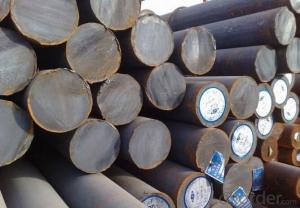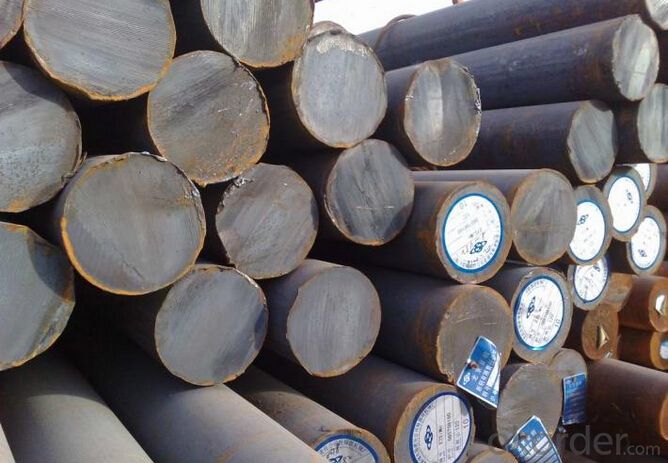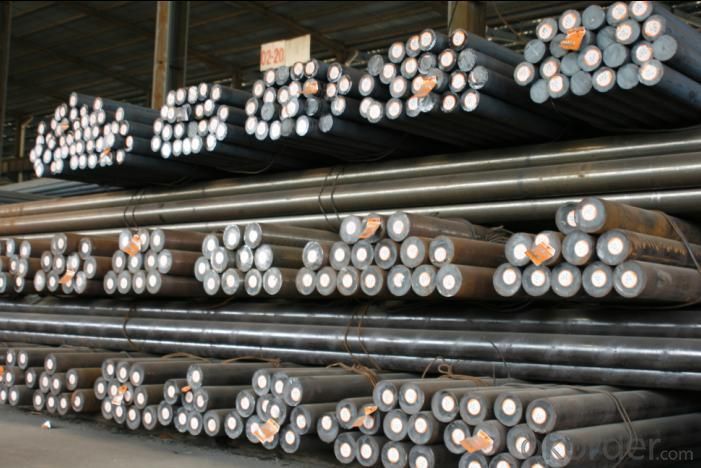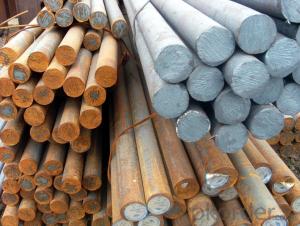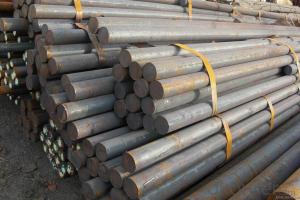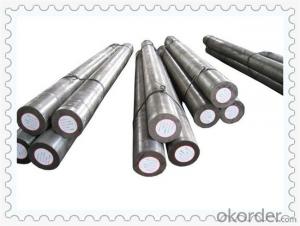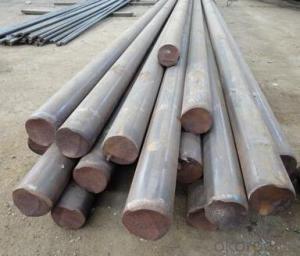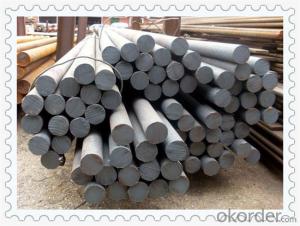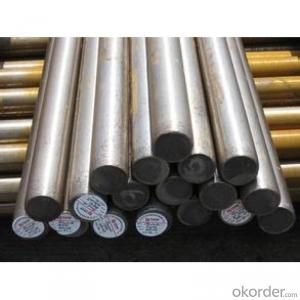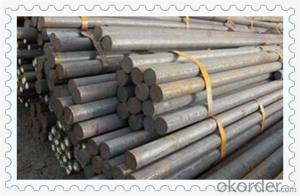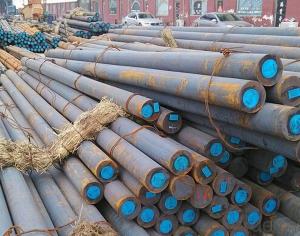Round Bars Carbon Steel 1020 1045 1040
- Loading Port:
- China main port
- Payment Terms:
- TT OR LC
- Min Order Qty:
- 30 m.t.
- Supply Capability:
- 10000 m.t./month
OKorder Service Pledge
OKorder Financial Service
You Might Also Like
Specification
Round Bars Carbon Steel 1020 1045 1040
Product Information:
Material:High Quality Carbon Structural Steel 1020
Size:Diameter:10-700mm
Length:6000mm-12000mm
Origin place :Made In China
Delivery Condition:Hot rolled, cold drawn, forged
Surface require:Black, grinding, bright, polish
Heat treatment:Quenched, Tempered, annealed
Packing:Seaworthy packing ,wooden case ,carton,woven bag or at client's requires
Delivery time:According to order’s quantity.
Trade Term:EXW,FOB,CIF
Payments:T/T or L/C at sight
Port:China main Port, such as shanghai, Dalian, Shenzhen port.
MOQ:30 Metric Ton
| Material | AISI 1020, S20C, C22,1.0402 | Round bar | Dia(mm) | Max 700 |
| Process | EAF + LF + VD + Forged + Heat Treatment (optional) | Length (mm) | Max 12000 | |
| Heat treatment | Normalized / Annealed / Quenched / tempered | Plate bar | Thickness(mm) | Max 200 |
| Delivery condition | Hot forged +Rough machined (black surface after Q/T)+ Turned (optional) | Width(mm) | Max 3000 | |
| Test | Ultrasonic test according to SEP 1921-84 D/d | Length (mm) | Max 12000 |
Product Overviews:
| Product Name | Typical Grades | Diameter(mm) | Standard adopted |
| Carbon Steel | 20 (1020/S20C/C22) | Ø16-Ø300 | GB/SAE/JIS/DIN |
| 40 (1040/S40C/C40) | |||
| 45 (1045/S45C/C45) | |||
| Bearing Steel | GCr9 (51100/SUJ1) | Ø12-Ø250 | |
| GCr15 (52100/SUJ2/100Gr6) | |||
| GCr9SiMn (A485-Gr.1/SUJ3) | |||
| Cr-Mo Steel | 20Cr (5120/SCr420H/20Cr4) | Ø12-Ø250 | |
| 40Cr (5140/SCr440/41Cr4) | |||
| 42CrMo(4140/SCM440/42CrMo4) | |||
| Gear Steel | 20CrNiMo | Ø16-Ø600 | |
| 20CrMn(5115/SMnC420/20MnCr5) | |||
| 20CrNiMo(8620/SNCM220/20CrMiMo2) |
Product Show:

Our Advantages:
· Industry experience over 20 years.
· Shipment of goods -More than 70 countries worldwide.
· The most convenient transport and prompt delivery.
· Competitive price with best service.
· High technical production line with top quality products.
· High reputation based on best quality products.
With our experienced, enthusiastic and dynamic staffs, we assure to bring you the products with best quality, reasonable prices and good after-sales services under the motto: Friends First, Business After.
Communication, Experience, Expertise and Best efforts are our Promises to you.
- Q: How does special steel perform in high-temperature mechanical applications?
- Special steel is specifically designed to perform exceptionally well in high-temperature mechanical applications. Unlike regular steel, special steel contains alloying elements such as chromium, nickel, and molybdenum, which enhance its heat resistance and mechanical properties. At high temperatures, special steel exhibits excellent strength and toughness, ensuring it can withstand the harsh conditions encountered in high-temperature environments. It retains its structural integrity even when exposed to extreme heat, making it suitable for applications such as furnaces, boilers, and gas turbines. Special steel also maintains its dimensional stability at elevated temperatures, which means it does not deform or warp easily. This property is crucial in high-temperature mechanical applications where precise dimensions and tight tolerances are required for optimal performance. Furthermore, special steel exhibits excellent corrosion resistance, even at high temperatures. This resistance is crucial in preventing the formation of oxide scales and reducing the risk of premature failure due to corrosion. In summary, special steel performs exceptionally well in high-temperature mechanical applications due to its enhanced heat resistance, strength, toughness, dimensional stability, and corrosion resistance. It provides reliability and durability in extreme heat conditions, making it a preferred choice for various industries where high-temperature environments are encountered.
- Q: What are the main factors affecting the cost of special steel?
- The main factors affecting the cost of special steel include the cost of raw materials, such as iron ore and other alloying elements, as well as the cost of energy required for the manufacturing process. Other factors include the complexity of production methods, the level of demand and supply in the market, transportation costs, and any additional costs associated with quality control and compliance with industry standards.
- Q: What are the different types of coatings for special steel?
- There are several types of coatings that can be applied to special steel to enhance its performance and protect it from various environmental factors. Some of the common types of coatings for special steel include: 1. Zinc-based coatings: These coatings, such as galvanized steel, provide excellent corrosion resistance. The zinc layer acts as a sacrificial barrier, protecting the underlying steel from rusting. 2. Epoxy coatings: Epoxy coatings are highly resistant to chemicals, moisture, and abrasion. They are often used in industries where the steel is exposed to harsh conditions or corrosive substances. 3. Powder coatings: Powder coatings offer a durable and attractive finish to special steel. They are applied as a dry powder and then cured under heat, forming a hard, protective layer that is resistant to chipping, fading, and corrosion. 4. Ceramic coatings: Ceramic coatings are known for their high-temperature resistance and excellent thermal insulation properties. They are often used in applications where the steel is exposed to extreme heat or rapid temperature changes. 5. Organic coatings: Organic coatings, such as acrylics and polyurethanes, provide a protective barrier against moisture, UV radiation, and chemicals. They are commonly used in outdoor applications, such as architectural structures or automotive parts. 6. Phosphate coatings: Phosphate coatings are primarily used as a pre-treatment before applying other coatings or paints. They improve adhesion and corrosion resistance of subsequent layers, providing a more durable finish. 7. Polymer coatings: Polymer coatings offer excellent resistance to abrasion, impact, and chemicals. They are commonly used in industrial settings where steel is subject to heavy wear and tear. It is important to select the appropriate type of coating based on the specific requirements of the special steel and the environment it will be exposed to. Each coating type has its own set of advantages and limitations, so a thorough analysis should be conducted to determine the most suitable option.
- Q: What are the specific requirements for special steel used in nuclear applications?
- Special steel used in nuclear applications has specific requirements to ensure its suitability and safety within the highly demanding and sensitive nuclear environment. These requirements are designed to guarantee the integrity and performance of the steel in various conditions, including extreme temperatures, radiation exposure, and corrosive environments. One of the primary requirements for special steel used in nuclear applications is high strength and toughness. The steel must possess excellent mechanical properties to withstand the immense pressure and stress that it will experience during operation. This enables the steel to resist deformation, cracking, and failure, ensuring the structural integrity of nuclear components. Another crucial requirement is the ability to withstand high temperatures and thermal cycling. Nuclear reactors operate at elevated temperatures, and the steel must retain its mechanical properties even under extreme thermal conditions. This prevents any degradation or loss of strength that could compromise the safety and efficiency of the nuclear system. Furthermore, special steel used in nuclear applications must exhibit exceptional resistance to corrosion and oxidation. The nuclear environment can be highly corrosive due to the presence of various chemicals and coolants, such as water, steam, and coolant gases. The steel must possess a high level of corrosion resistance to prevent any degradation or material loss, which could lead to leaks or failures. Radiation resistance is also a critical requirement for special steel used in nuclear applications. Nuclear reactors emit ionizing radiation, which can damage the structure and properties of conventional materials. Therefore, the steel must have a high resistance to radiation-induced embrittlement and degradation, ensuring its long-term performance in a radioactive environment. Additionally, the steel used in nuclear applications must comply with strict quality control and certification standards. These standards ensure the steel's traceability, material composition, and manufacturing processes, guaranteeing its reliability and compliance with regulatory requirements. Quality control measures include non-destructive testing, ultrasonic examinations, and material certification. Overall, the specific requirements for special steel used in nuclear applications encompass high strength, toughness, thermal stability, corrosion resistance, radiation resistance, and adherence to stringent quality control standards. Meeting these requirements is crucial to ensure the safe and reliable operation of nuclear systems while mitigating potential risks associated with the nuclear environment.
- Q: How does the addition of nickel enhance the properties of special steel?
- The properties of special steel are enhanced in several ways through the addition of nickel. To begin with, the strength of steel is increased by nickel, resulting in enhanced durability and resistance to deformation. This is particularly crucial in situations where the steel will be exposed to high temperatures or heavy loads. Additionally, the corrosion resistance of steel is improved by nickel. When exposed to moisture or harsh chemicals, nickel forms a protective oxide layer on the steel's surface, preventing rusting or corrosion. This is particularly valuable in industries like marine, aerospace, and chemical processing, where steel is frequently subjected to corrosive environments. Furthermore, the toughness of steel is improved by nickel, allowing it to withstand impact or sudden temperature changes without fracturing or cracking. This makes it suitable for applications that require high resistance to shock or vibration, such as construction, automotive, or machinery manufacturing. Moreover, nickel enhances the heat resistance of steel. By increasing the steel's ability to retain strength and shape at high temperatures, nickel makes it suitable for use in high-temperature environments, such as power generation, oil and gas, or furnace systems. In conclusion, the addition of nickel to special steel enhances its strength, corrosion resistance, toughness, and heat resistance. These improved properties make nickel-enhanced steel highly desirable in a wide range of industries and applications, where durability, reliability, and performance under challenging conditions are of utmost importance.
- Q: How is precipitation-hardening steel used in the aerospace industry?
- Precipitation-hardening steel, also known as PH steel, is extensively used in the aerospace industry due to its exceptional strength-to-weight ratio and excellent corrosion resistance. This type of steel undergoes a heat treatment process that enables the formation of fine precipitates within its structure, resulting in improved mechanical properties. In aerospace applications, precipitation-hardening steel is commonly utilized for manufacturing critical components such as landing gear, engine parts, and structural elements. Its high strength and durability allow for the construction of lighter and more fuel-efficient aircraft, enhancing overall performance and safety in the aerospace sector.
- Q: What is the impact of high temperature on the mechanical properties of special steel?
- High temperatures can significantly affect the mechanical properties of special steel. As the temperature increases, the steel's strength and hardness decrease, leading to reduced load-carrying capacity and increased susceptibility to deformation and failure. High temperature can also cause a decrease in toughness and ductility, making the steel more brittle and prone to fracture. Additionally, the expansion and contraction of the steel due to thermal cycling can induce stress and lead to thermal fatigue, further compromising its mechanical integrity. Therefore, it is crucial to consider the impact of high temperature on the mechanical properties of special steel when designing and operating systems that involve elevated temperatures.
- Q: What are the applications of special steel in the oil and gas supply chain?
- Special steel has various applications in the oil and gas supply chain. It is commonly used in the construction of pipelines, offshore platforms, and drilling equipment due to its high strength, corrosion resistance, and ability to withstand extreme conditions. Special steel also finds its utility in the manufacturing of valves, fittings, and connectors, ensuring efficient and leak-free operations. Additionally, it is used in the production of storage tanks and vessels, providing reliability and safety in the containment of oil and gas. Overall, special steel plays a crucial role in enhancing the durability, performance, and safety of equipment and infrastructure within the oil and gas supply chain.
- Q: How does special steel perform in terms of thermal conductivity?
- Special steel typically has lower thermal conductivity compared to other materials like aluminum or copper. This means that it is not as efficient in conducting heat, but it can still be used in applications where high temperatures need to be controlled or insulated, such as in industrial furnaces or high-temperature equipment.
- Q: Can special steel be used in the manufacturing of precision instruments?
- Indeed, precision instruments can benefit from the utilization of special steel. Special steel encompasses a range of steel types that have been purposefully crafted and processed to possess specific attributes, such as heightened strength, hardness, resistance to corrosion, and thermal stability. These unique qualities render special steel highly suitable for applications necessitating precision and accuracy, such as precision instrument manufacturing. Precision instruments, such as surgical tools, measuring devices, optical instruments, and scientific equipment, necessitate materials capable of retaining dimensional stability and enduring extreme conditions. Special steels, such as stainless steel, tool steel, and high-speed steel, provide exceptional mechanical properties, including remarkable tensile strength, resistance to wear, and dimensional stability. Consequently, these kinds of steel are well-suited for the production of precision instruments. Moreover, special steel can be engineered to possess specific characteristics, such as low magnetic permeability or excellent resistance to temperature fluctuations. These attributes prove particularly vital in precision instruments, as magnetic interference or temperature variations have the potential to impact their performance. To summarize, special steel can indeed be employed in the manufacturing of precision instruments due to its exceptional mechanical properties, dimensional stability, and ability to withstand harsh conditions. Its versatility enables the production of precision instruments of superior quality, fulfilling the stringent requirements of various industries, including the medical, scientific, and engineering sectors.
Send your message to us
Round Bars Carbon Steel 1020 1045 1040
- Loading Port:
- China main port
- Payment Terms:
- TT OR LC
- Min Order Qty:
- 30 m.t.
- Supply Capability:
- 10000 m.t./month
OKorder Service Pledge
OKorder Financial Service
Similar products
Hot products
Hot Searches
Related keywords
